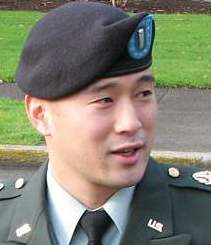A US Army prosecutor subpoenaed Truthout contributing reporter Sarah Olson Thursday morning, seeking her sworn testimony at the court-martial of First Lieutenant Ehren Watada. The 28-year-old Army officer refused deployment to Iraq earlier this year. His trial is expected to begin in February.

Lt. Watada
Olson wrote a news story about Watada in June that was published June 7 on the Truthout web site. In that article, Watada publicly challenged the legality of the war - in statements the Army claims are illegal. It is believed that the Army wants Olson to authenticate the substance of her article and to confirm the statements Watada made to her.
"As I read about the level of deception the Bush administration used to initiate and process this war, I was shocked. I became ashamed of wearing the uniform," Watada said in Olson's interview.
The charges filed against Watada marked the first time in 41 years that the military has used the charge of conduct unbecoming an officer to prosecute an officer's public statements. Usually, a conduct-unbecoming case involves more-serious crimes, such as rape, sexual harassment, or manslaughter. The last time a military officer was charged with public dissent was in 1965, when Lieutenant Henry Howe criticized US foreign policy during the Vietnam War.
Moreover, the Watada case is significant - and to some degree historic - because it is the first time the Army is actively seeking testimony of a professional journalist to prove one of its own officers violated military law by publicly questioning the rationale for war. Other cases involving the military and the media have, for the most part, involved the military's desire to subpoena unpublished material, such as videotapes and notes, from reporters.
A US attorney in a US district court could prosecute civilian witnesses who fail to respond to a military subpoena without a valid reason.
Olson, who is one of few reporters covering the anti-war movement and the voices of dissent, said in an interview that she was served with a two-page subpoena at 8:45 a.m. Thursday morning at her home in Oakland, demanding that she appear at Watada's court-martial in Fort Lewis, Washington, February 5 through 9.
Olson, 31, could not divulge what her next move will be - whether she'll go to jail if all appeals fail - but it's apparent that she's leaning toward fighting the US Army from forcing her to testify against a soldier whose actions she has said she respects and supports.
"The military's willingness to subpoena journalists is wrongheaded and ominous," Olson said. "It's a reporter's job to report the news. It's not a reporter's job to participate in the prosecution of ... sources. Once you involve a reporter in prosecution, you turn that reporter into the investigative arm of the government."
Olson pointed out that it's not uncommon for journalists to confirm the veracity of their work, but in her case, doing so could send Watada to jail for several years.
"In my case, what the Army is asking is understood as exceedingly reasonable," Olson said. "Journalists don't have a problem verifying the veracity of their reporting, as I am being asked to do by the subpoena. What I think makes it different is the nature of this case. Basically, what the Army is doing is compelling me to build its case and participate in the prosecution of Lieutenant Watada, simply by confirming my reporting. That's something I don't think any journalist can do. They are using me to build their case and to punish military personnel for talking to the press."
Scott Galindez, managing editor of Truthout, said Thursday that the non-profit news organization stands behind Olson.
"We will support Sarah in any efforts she undertakes to protect her constitutional rights as a journalist," Galindez said. "While we won't be intimidated by the Army's tactics, we are afraid individual reporters might think twice before covering stories that might put them in the Army's cross hairs."
Lieutenant Joe Piek, a military spokesman who is stationed at Fort Lewis, where Watada also is based, would not comment on any aspect of the Watada case, nor would he discuss the reasons the military is trying to secure testimony from the media.
In addition to Olson, Truthout reported Wednesday that Captain Dan Kuecker, the Fort Lewis, Washington-based Army prosecutor pursuing charges against Watada, had stated his intent to subpoena Truthout Executive Director Marc Ash, Truthout reporter Sari Gelzer, and contributing reporter Dahr Jamail to testify at Watada's court-martial. As of Thursday, none of the three had been served with subpoenas.
It is likely that Kuecker wants Gelzer to discuss a short news report she filmed over the summer. In that report, Watada, at the Veterans for Peace annual conference, said the Iraq War was based on lies and remarked that US soldiers could refuse to fight. According to Bill Simpich, Truthout's attorney, the military is clearly interested in having Gelzer confirm the authenticity of the film and the statements by Watada that were caught on tape.
If Gelzer or Ash is subpoenaed, Simpich said the Army is in "for a big fight."
At a hearing earlier this year, a military court determined that there was sufficient evidence to charge Watada with intentionally missing his deployment, contemptuous speech toward officials, and conduct unbecoming an officer, and to proceed with a general court-martial. In September, those charges were amended to include an additional count of conduct unbecoming an officer. The contempt charges were dropped in November. Watada faces a maximum six-year prison sentence if he is convicted.
Watada was a member of the Army's First Stryker Brigade Combat Team at Fort Lewis when, on June 22, he became the first commissioned officer to refuse assignment with the unit to Iraq. He has since been reassigned to an administrative position.
Redacted documents outlining the charges against Watada cite reports by Olson and by Honolulu Star-Bulletin reporter Gregg K. Kakesako, quoting Watada as saying that President Bush had lied about the reasons the US went to war in Iraq.
Watada's attorney, Eric Seitz, contends his client's comments are protected free speech.
Kakesako would not comment Thursday on whether he had been served with a subpoena.
http://www.truthout.org/docs_2006/printer_121506J.shtml

by Judith Scherr via rialator 2006-12-19 14:10:51
Freelance journalist Sarah Olson does not want to testify at First Lt. Ehren Watada’s court marshal in February. At around 8:45 a.m. on Thursday, she received a subpoena from the U.S. Army telling her to do so.
Watada is the first commissioned officer to publicly refuse deployment in Iraq. Because of his public comments against the war, Watada is charged not only with refusal to deploy, but with “contempt toward officials” and “conduct unbecoming of an officer.”
Oakland-based Olson interviewed Watada in May and published a story in question-and-answer form in the June 7 online publication Truthout.org about Watada’s decision to refuse deployment.
“My commanders told me that I could go to Iraq in a different capacity. I wouldn’t have to fire a weapon and I wouldn’t be in harm’s way,” wrote Olson, quoting Watada. “But that’s not what this is about. Even in my resignation letter I said that I would rather go to prison than do something that I felt was deeply wrong. I believe the whole war is illegal. I’m not just against bearing arms or fighting people, I am against an unjustified war.”
For about a month, the army has been talking to Olson about testifying, “but she declined to appear voluntarily,” said James Wheaton of the First Amendment Project in Oakland. Wheaton is working with lead attorney David Greene, advising Olson of her options. Olson emailed the Daily Planet, declining an interview.
“She feels it is not a reporter’s job to become an investigative tool of the state,” Wheaton said.
Olson has not decided how she will answer the subpoena, Wheaton said.
Joe Piek, spokesperson for the Army at Ft. Lewis, Washington, where Watada will be court marshaled in February, said, “The Army subpoena asked for Olson to report to verify the authenticity of the information contained in news stories.”
He added that the army wants Olson simply to testify that the writing that appears in print is an accurate reproduction of what was actually said. “We’re not asking for notes or records,” he said.
Olson’s apparently not the only reporter the army wants to testify for the prosecution. While Dahr Jamail, another Bay Area freelance journalist who has interviewed Watada, has not yet received a subpoena. His attorney, Oakland-based Dan Siegel, told the Daily Planet he believes through sources at Truthout, that Jamail will be subpoenaed.
An independent reporter who has written for the London Guardian and the Independent, among other outlets, Jamail transcribed an Aug. 14 speech Watada gave to a Veterans for Peace Convention and published that in Truthout with a short introduction.
“We need to make sure journalists are not treated as government agents,” Siegel said, adding that his client would have to decide whether he was going to comply with any eventual subpoena.
According to Aaron Glantz, writing Dec. 14 for Interpress News Service, the military has also approached a Honolulu Star Bulletin reporter about testifying.
Ehren Watada’s father, Bob Watada, is outspoken on the question of bringing in reporters to testify. “It’s intimidation,” he said in a phone interview Monday. “It’s harassment of the media.”
If the journalists testify, it could hurt Watada’s case and, at the same time, it could help it, said Watada’s attorney Eric Seitz, speaking in a phone interview from Honolulu, Hawaii. “If they don’t testify, the government can’t prove they made the remark,” Seitz said. “They have to authenticate it—we’re not willing to agree [otherwise].”
But it would help Watada’s case if they testified to the context of the remarks, that they were made off the base and not in uniform, Seitz said.
By adding charges related to what Watada said and by trying to bring in journalists to attest to that, “they’re trying to suppress dissent,” Seitz said.
Berkeley resident and Society for Professional Journalism ethics committee member Peter Y. Sussman, while not familiar with the details of Olson’s subpoena or Jamail’s possible subpoena, noted that this “appears to be part of a pattern of intimidation of using journalists as an arm of law enforcement, undermining the freedom of the press.”
Sussman pointed to Josh Wolf, the San Francisco freelance journalist who refused to turn his videotapes of a demonstration over to police and is now serving time in federal prison. He may be jailed until the Grand Jury’s term expires in July. “Josh Wolf is currently in prison for acting as a journalist,” said Sussman, one of whose books is entitled, Committing Journalism.
“Our mission as journalists is jeopardized if we are perceived, because of a subpoena, as agents of the government.”
Army spokesperson Piek declined to comment on the ethics of compelling journalists to testify in court. “We don’t debate with SPJ on this,” he said.
http://www.berkeleydailyplanet.com/article.cfm?issue=12-19-06&storyID=25901